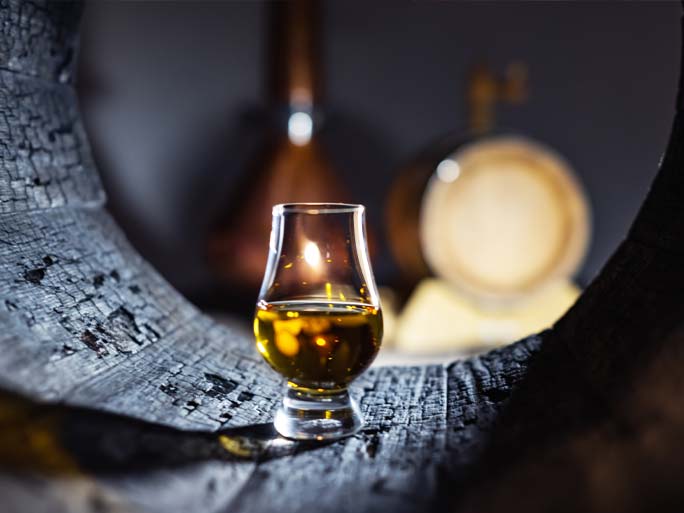Written by Gordon Coxhil, Whisky Enthusiast & Journalist
The highly respected Knight Frank Wealth Report of 2020 (based on bottle hammer price at auction) said nothing about discovering a Van Gogh self-portrait, missing for 100 years and presumed lost, in your attic; turning the art world into a frenzy and you into an overnight multi-millionaire. Dream on.
What the report did say was that rare, aged whisky was the best-performing collectible asset of the previous decade, growing a colossal 586% over those 10 years. Such a high level of sustained growth meant that the rare whisky market out-performed precious gems, vintage cars, premier cru wines, fine art and stock markets. And with the world being such a volatile place at the moment, investors big and small are looking for different, interesting and above all, reliable homes for their money. In addition to carnage and destruction, war brings uncertainty, supply disruptions, and changing international relations; factors which the stock markets hate. Crypto-currencies remain a little too cryptic for all but the optimistic adventurer, while in recent years savings accounts have largely been a contradiction in terms.
Scotch malt whisky is old but not as old as the hills that are home to the springs and burns that play such a huge part in the final taste of the spirit, which will be discernibly different from that of another distillery a quarter of a mile up the glen. This is just part of the attraction of arguably Scotland’s greatest product, certainly its best-known internationally. Whisky adds £5.5bn to the UK economy, it accounted for £4.5bn worth of exports in 2021 to 100s of countries in five continents. You only have to open one of the 44 bottles that leave the UK for distant parts every second, to understand why this simple yet complex distillation of fermented barley continues to find an increasing number of devotees year after year.
As a warming, aromatic and deeply satisfying drink, malt whisky has no equals. For some time, it has proved an equally satisfying investment.
The huge sums that changed hands at two world record-breaking auctions recently were of course highly exceptional. First, back in April, the owner of a cask of Macallan which had been quietly maturing in a warehouse in Aberlour since 1988, was surprised to receive a call from the distillery. He had forgotten about his purchase of all those years previously, for which he had paid £5,000. At auction, the cask sold for well over £1,000,000, smashing the previous record of £444,000 set in 2019.
And then in early July, a cask of Ardbeg, distilled on the isle of Islay in 1975, was sold to an Asian buyer for an eye-watering £16m. Ardbeg is a superb malt whisky, and this coupled with the fact that much of the whisky goes to blenders, and secondly, a lengthy period of mothballing through the 1980s meant that pre-1980 distillations were always going to be highly sought after.
But even allowing for these headline-grabbing anomalies, the wise buyer, having done due diligence and knowing his or her long-term plans for their investment, can count on annual projected returns of 8-12% (case study available at your request), and quite possibly considerably more. The mechanics of making the investment could not be easier; an initial discussion with a knowledgeable, experienced expert in the field to discover preferences and expectations, followed by the purchase of the cask from one of the many Scottish distilleries, and then sit back and wait for nature, the wood of the cask, the alchemy of malted barley, the micro-climate and the spirit of place to work their slow magic.
When the whisky has reached a certain maturity, and this will depend on locality, brand, precedent, and indeed personal preference, there is an important decision to be made. Do you sell the cask and present the proceeds to a grandchild about to embark on three or four years at university or walk up the aisle? Or have the drama of presenting it under the gavel at one of the great auction houses? Or have it bottled under your own label, a gift for friends or business associates? Or do you simply look forward to many a winter’s evening, curled up in a favourite armchair in front of a log fire with a hide-bound volume of Sir Walter Scott in one hand, and a tulip glass of a complex, gently warming, aromatic spirit in the other?
Untold wealth from your investment is not guaranteed. A heightened interest in the making of a glorious, emblematic drink, followed by a vast amount of pleasure most certainly is.
Download our whisky investment guide today.


